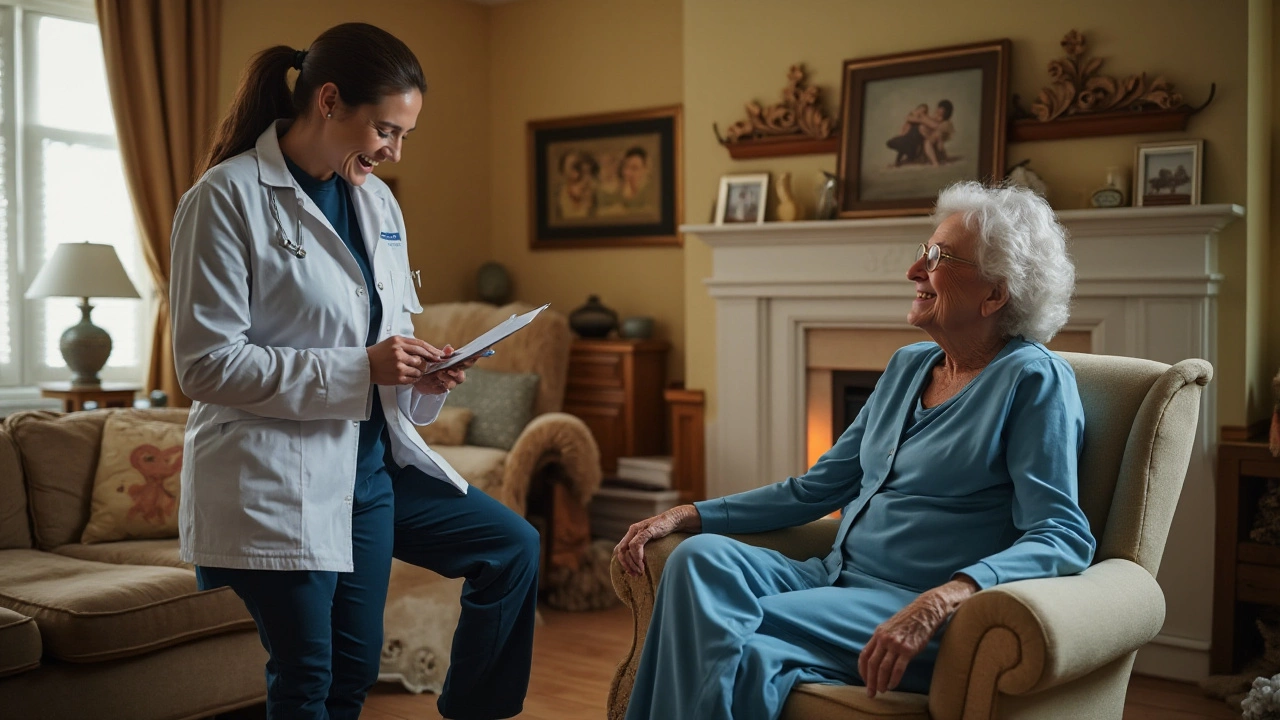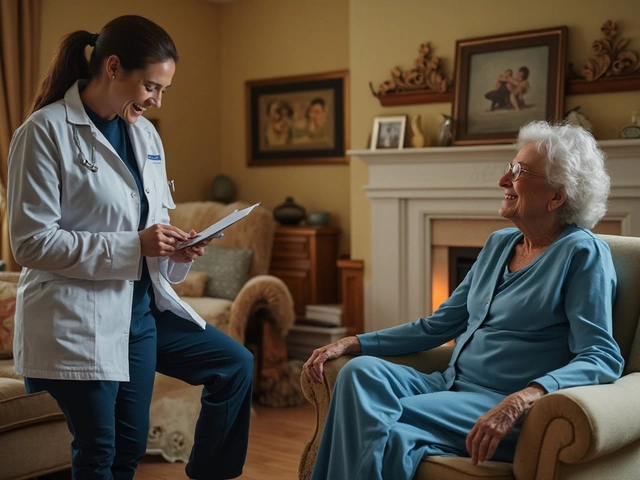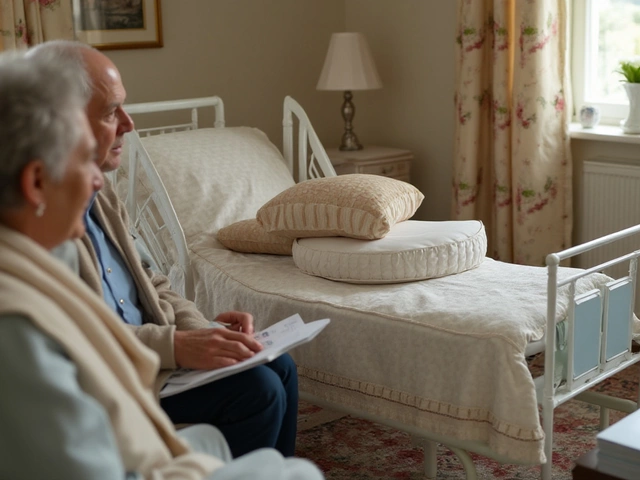When a loved one is diagnosed with dementia, families often face the challenge of managing care while maintaining the comfort of their home environment. The question of whether Medicare covers home care for dementia patients is a common concern for those trying to navigate the complexities of healthcare.
The good news is, Medicare offers several coverage options that can support in-home care. However, understanding the specifics is crucial to make the most of this federal program. It's important to know not only what is covered, but also recognize what is left out and how to supplement care when needed.
Exploring Medicare and its coverage for dementia patients requires a deep dive into the types of care provided, who qualifies for them, and how to effectively utilize these benefits. From navigating the system to accessing additional resources, caregivers can find invaluable insights to aid their journey.
- Understanding Medicare Coverage
- Types of Home Care Services
- Eligibility Criteria
- Navigating the Medicare System
- Supplemental Support Channels
- Practical Tips for Caregivers
Understanding Medicare Coverage
Navigating through Medicare can feel like wading into a vast ocean with no compass, especially when seeking aid for home care services for dementia patients. It’s crucial to grasp what this federal health insurance program entails. Medicare, known for supporting individuals aged 65 and older as well as certain younger people with disabilities or specific conditions, often covers a variety of healthcare services. But understanding its details and limitations can make a significant difference in ensuring dementia patients receive appropriate care at home.
Medicare is divided into several parts, with Part A and Part B being particularly relevant for home care. Part A generally covers hospital stays, skilled nursing facilities, and some home health services, while Part B deals with doctor services, outpatient care, and some other medical services that Part A doesn’t cover. However, when it comes to home care for dementia patients specifically, it’s essential to understand that Medicare coverage often centers on medical needs — not personal care or 24-hour supervision, which are frequently required for those living with dementia.
According to the Centers for Medicare & Medicaid Services, "Medicare typically pays for a limited number of home health visits when you meet certain criteria such as being homebound and needing skilled care." This highlights the crucial necessity for patients to qualify based on specific medical conditions and rehabilitation expectations.Eligibility, therefore, hinges on several factors, including the requirement for skilled nursing care or occupational therapy. Patients or their caregivers must ensure that services are offered through Medicare-certified providers. Such nuances, if overlooked, can result in unexpected expenses and missed opportunities for receiving funded support.
It's worth noting that even with Medicare's coverage, the types of services covered under home health are generally limited to the necessary medical services. Custodial care, like meal preparation, shopping, or bathing, remains outside Medicare's financial remit. This essentially bifurcates the responsibility of care into what Medicare provides versus what families must arrange independently or through other resources. Here lies the intricate balance of leveraging Medicare while seeking supplemental forms of support, be it through state programs, private insurance, or nonprofit organizations specializing in elder care.
To further assist families in making informed decisions, the program offers an annual Medicare & You handbook that details coverage options and expectations. Subscribers are encouraged to continually review updates, as understanding Medicare’s adjustments each year can significantly affect a family’s caregiving dynamics and financial planning. Getting ahead of these changes can also aid in predicting what challenges might arise in providing comprehensive care.
Moreover, families should engage with a Medicare expert or a geriatric care manager, who can elucidate the nuances of policies and help orchestrate a cohesive care plan for dementia patients. With the complexities surrounding Medicare's provisions in mind, a personalized approach to understanding and utilizing these resources is often the most effective path forward.
Types of Home Care Services
When discussing home care services for dementia patients, it's crucial to recognize the varied nature of care supported by Medicare. These services not only cater to the medical needs of patients but also address some of the day-to-day challenges families face. At the heart of Medicare's home care offerings are essential services like skilled nursing care, physical therapy, and sometimes occupational therapy. Skilled nursing care is often necessary for patients who need medical attention post-hospitalization or for chronic condition management. Nurses can administer medications, manage wound care, and monitor vital signs, ensuring that health issues are caught promptly.
While skilled nursing care is at the forefront, home care through Medicare might also cover physical therapy needs. Physical therapists play an essential role by assisting patients in maintaining or restoring physical function. For dementia patients, mobility and balance exercises can substantially improve independence in daily activities and reduce the risk of falls, which is a common concern. Occasionally, occupational therapists are part of the Medicare-covered home care team. They help patients in adapting their home environments and routines to maintain autonomy as dementia progresses. It's all about optimizing the patient's environment and capabilities, ensuring safety and a level of independence.
Home health aide support is another crucial service for dementia care, albeit Medicare typically covers it under certain conditions. These aides assist with activities of daily living such as bathing, dressing, and meal preparation, but this is only when other medical services are also in play. It's a necessary support for families juggling care responsibilities with other commitments. However, Medicare rarely covers the long-term custodial care that numerous dementia patients require as their condition progresses. This gap often necessitates exploring other funding or assistance programs beyond Medicare.
According to a statement by the Centers for Medicare & Medicaid Services, "Medicare Home Health Benefit includes part-time or intermittent skilled nursing care, physical therapy, and continued occupational therapy, but it is important to note when custodial care becomes necessary, families will have to look beyond standard Medicare coverage."
Families often find themselves in a position where they must supplement Medicare offerings with private pay options or assistance from programs like Medicaid or VA Aid, especially for ongoing personal care services. Knowing the scope and limits of what's covered allows families to plan better and ensure their loved ones' needs are comprehensively met. Exploring the types of home care services available lays a solid foundation for those planning long-term, as this allows for more informed decisions on creating a safe, compassionate home environment for dementia patients.

Eligibility Criteria
When it comes to determining eligibility for Medicare coverage regarding home care for dementia patients, understanding the nuances of the system is essential. The coverage primarily hinges on the specifics of the Medicare plan in question, notably the distinctions between Part A, Part B, and Part C. Each offers different advantages and constraints, which can be vital information for caregivers trying to ease the burden of care.
Medicare Part A, commonly referred to as hospital insurance, can provide some level of home health care, but typically under stringent conditions. For instance, beneficiaries must be deemed homebound, often requiring certification from a physician acknowledging the necessity of skilled nursing care. Moreover, the care needed should be intermittent, not full-time, emphasizing the program's focus on rehabilitation over long-term custodial care. A study highlighted by the National Institute on Aging remarks, “Navigating these requirements precisely is crucial to optimizing the benefits available under Medicare.”
Part B comes into play particularly when dealing with outpatient care. It may cover certain therapies necessary for dementia patients, like occupational therapy, albeit again limited by necessity-based criteria. The care must be deemed medically reasonable and necessary, presenting speculative hope for families based on particular health conditions and requirements. Here, too, a physician's assessment is indispensable to establishing eligibility. Routine personal care alone does not usually qualify under Medicare's stringent guidelines, rendering many families perplexed about financing non-medical care necessities.
For those considering Medicare Advantage Plans, or Part C, the story might be different. These plans are an amalgamation of Part A and Part B services often tailored with added benefits not covered by traditional Medicare. However, plan availability is shaped by variables like geographic location and associated costs, making diligent research pivotal. An unfamiliar statistic from the Kaiser Family Foundation notes that around 40% of Medicare beneficiaries are enrolled in Medicare Advantage, highlighting its growing appeal.
Understanding the bureaucracy, however, is crucial. Each component of Medicare has nuanced qualifications with sometimes labyrinthine criteria, yet awareness can unlock meaningful support pathways for families. Services that include home care visits should be intermittently spaced and tied to specific recovery processes. Reading through documentation, consulting with Medicare experts, and connecting with local support groups can alleviate some of the stress and provide clarity amidst administrative perplexities. Ultimately, educating oneself about these complex criteria cannot be overstated as mistakenly resigning without due challenge could forfeit necessary assistance for dementia patients.
Navigating the Medicare System
Understanding the Medicare System can sometimes feel like learning a new language. It encompasses many rules, terms, and benefits that caregivers must dissect to access the right coverage. For those seeking home care for dementia patients, it begins with distinguishing between Medicare's parts: Part A (hospital insurance) and Part B (medical insurance) are typically involved in covering home health services. However, discerning the types of support each part provides is vital. Part A often oversees coverage linked to hospital stays affecting subsequent in-home care needs. On the other hand, Part B tends to focus on specific medical needs that don't necessarily stem from a hospital stay but are critical for managing dementia symptoms in a home setting.
When exploring eligibility, it's important to recognize specific criteria and conditions outlined by Medicare. The coverage for home care services usually requires the patient to be under a doctor's care and homebound, with a doctor certifying the need for in-home care. Often, this means that although the patient can leave home for occasional, non-medical reasons, leaving requires a taxing effort. Partnering with a Medicare-certified home health agency becomes crucial as they not only provide the required care but assist in efficiently coordinating with Medicare to ensure seamless service delivery.
Moreover, caregivers should delve into the nuances of Medicare's coverage assessments. Medicare typically covers a limited number of hours per week of home health care. These services might include skilled nursing, occupational therapy, or physical therapy, essential for dementia patients whose condition demands continuous monitoring and adjustment of care methods. Understanding when Medicare stops or reduces these services is critical; eligibility is regularly re-evaluated, and coverage may change based on the patient's health improvements or decline.
For those navigating this labyrinth for the first time, resources are available. The official Medicare website provides essential details and updated regulations that can guide you. There's a wealth of workshops and online webinars geared toward explaining the ins and outs of Medicare too. Consulting with a Medicare advisor or a geriatric case manager can also bring clarity. As a longstanding caregiver stated:
"Getting familiar with Medicare was daunting, but once I understood the process, it transformed our care approach."Their experiences underscore the importance of patience and persistence in understanding Medicare's working structure.
Additionally, understanding the appeals process is another important aspect. Sometimes, services may be denied or not fully covered, and knowing the steps to appeal, gathering the necessary documentation, and presenting a strong case can make a significant difference. Engage with patient advocacy groups that often have resources and templates to assist in the appeals process. These organizations can also connect caregivers with others in similar situations, turning a solitary journey into a shared one, where learning from peers can smooth out the often frustrating path of Medicare navigation.
The path can be daunting, but the blend of preparation, professional guidance, and available resources can allow caregivers to steer through with resilience and confidence. Emphasizing constant education and community resources can bring huge benefits, easing the caregiving experience while ensuring dementia patients receive the care Medicare offers and they deserve at home.

Supplemental Support Channels
Caring for dementia patients often extends beyond what standard Medicare can offer, leading families to seek additional support channels that can fill the gaps. Fortunately, several programs and resources stand ready to provide that crucial extra layer of care. These channels not only alleviate caregivers' burdens but also significantly enhance the quality of life for dementia patients. To make informed decisions, it's essential to explore these options and understand how they might integrate with Medicare services.
Many non-profit organizations provide valuable resources for families and caregivers. One of the most notable is the Alzheimer’s Association, which offers a wealth of information and supportive services, including a 24/7 helpline that connects families with local resources. Additionally, Area Agencies on Aging (AAA) act as pivotal local sources of assistance—they are typically funded through the Older Americans Act and offer meal programs, respite care, and other senior services that can complement Medicare’s offerings. Their aim is to keep seniors independent, which aligns well with in-home care goals.
State and local Medicaid programs can also serve as an essential supplement, especially for those who qualify for both Medicare and Medicaid. Known as dual-eligibles, these individuals may receive benefits from both programs that cover a broader range of services, like personal care assistance that Medicare might overlook. According to a report by the Kaiser Family Foundation, approximately 20% of Medicare beneficiaries are also eligible for Medicaid benefits, highlighting the potential reach of this supplemental support.
"We’ve seen a marked improvement in care coordination when families utilize both Medicaid and Medicare," says an expert from The National Council on Aging. "These programs, when used together, help bridge important service gaps, particularly in home care scenarios."
Another option is long-term care insurance, which, while not suitable for everyone due to its cost, can provide robust coverage for in-home assistance. These policies are designed to cover custodial care, which is typically excluded by Medicare. Exploring employer-sponsored plans or group policies available through professional associations might also offer lower premiums or enhanced benefits, making them a feasible option for financing home care needs.
Community-based services represent yet another avenue, often sponsored by religious or civic organizations. These groups may offer volunteer services for transportation, companionship, or home-delivered meals; however, availability can vary depending on location and community reach. It's important for caregivers to create a comprehensive care strategy that not only addresses medical needs but also considers emotional support and day-to-day practical necessities.
Having a structured plan in place ensures that family caregivers can manage their duties more effectively while ensuring that dementia patients receive compassionate and continuous care. Navigating these support channels can seem daunting, but it is ultimately rewarding, providing peace of mind and improved care for loved ones. With careful planning and determination, accessing and combining these resources can lead to a sustainable and supportive care environment at home.
Practical Tips for Caregivers
Taking care of a loved one with dementia isn't just about providing basic needs; it involves emotional support, patience, and continuous adaptation to new challenges. As a caregiver, knowing how to navigate this journey can significantly affect both your well-being and that of your loved one. One of the first steps you can take is educating yourself about Medicare and the kind of home care it covers. For instance, while Medicare can assist with part-time skilled nursing care, it does not cover long-term home care or around-the-clock care, which means you will need to look for supplementary support systems.
Creating a structured routine can be incredibly beneficial for both you and your dementia patient. Predictable daily patterns help reduce anxiety and improve the ability to manage symptoms. You might want to incorporate simple activities like music therapy, which has shown positive effects on mood and cognition. Indeed, the Alzheimer’s Association highlights music's power to soothe and provide a comforting rhythm in the day which can assist with memory recall and promote joy through familiar tunes.
Leveraging community resources is vital in maintaining balance. Many communities offer respite care and support groups specifically for dementia caregivers. These provide the opportunity to take necessary breaks and connect with others who understand your journey's unique challenges. According to the Family Caregiver Alliance, engaging with others in similar situations can significantly reduce caregiver stress, which ultimately leads to better outcomes for your loved one.
Utilizing technological aids can also make a significant difference in daily caregiving tasks. Simple devices, such as medication reminders and electronic trackers, offer valuable help in ensuring the safety and well-being of your loved one. The acceptance of tech can initially pose a challenge, but its integration proves worthwhile as it empowers both caregivers and dementia patients in maintaining autonomy.
"Caregivers often find themselves on a solitary path, but community resources can open a world of support and invaluable connections," says a representative from the National Institute on Aging.
Don't overlook the support of professional associations like the Alzheimer's Foundation, which offer a wealth of guidance materials and telephone-based support systems. These organizations provide critical information regarding Medicare and other potential funding sources for dementia patients. With their help, you may uncover care options you hadn't previously considered, creating a smoother, more resourceful path through caregiving responsibilities. Always remember, in caregiving for a dementia patient, preparation and knowledge are your best allies.



